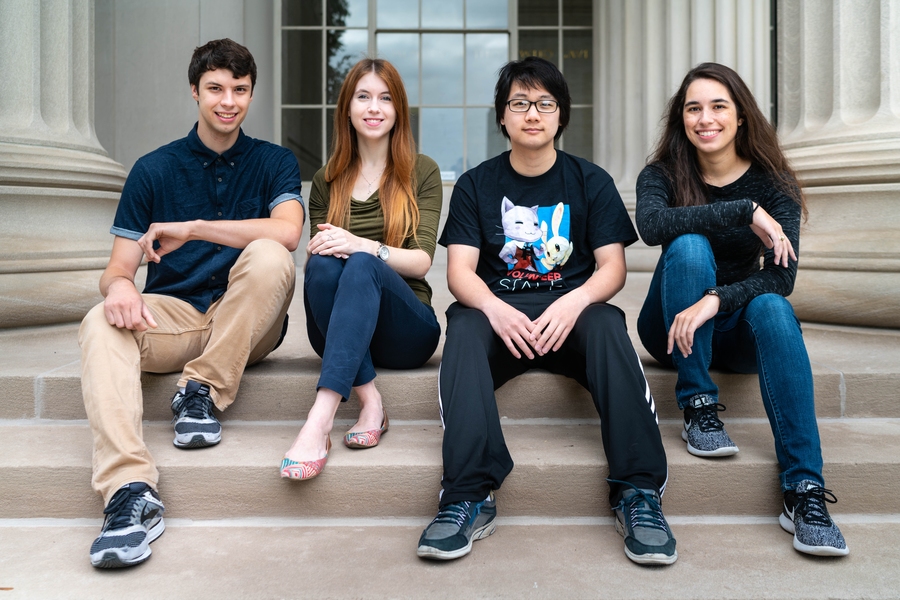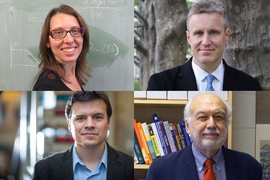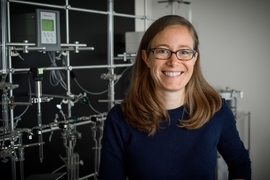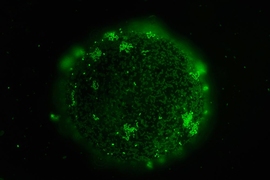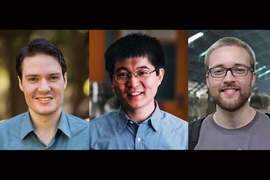Four MIT graduate students have been awarded 2018 United States Department of Energy (DoE) Computational Science Graduate Fellowships to address intractable challenges in science and engineering. Nationwide, MIT garnered the most fellowships out of this year’s 26 recipients.
The fellows receive full tuition and additional financial support, access to a network of alumni, and valuable practicum experience working in a DoE national laboratory. By supporting students like Kaley Brauer, Sarah Greer, William Moses, and Paul Zhang, the DoE aims to help train the next generation of computational scientists and engineers, incite collaboration and progress, and advance the future of the field by bringing more visibility to computational science careers.
Kaley Brauer is a graduate student in the Department of Physics. Her computational work in the Kavli Institute for Astrophysics and Space Research is uncovering new details about how galaxies form — including the origin of the Milky Way. Using high-performance computing simulations and theoretical models, she is identifying processes that underlie galaxy formation to learn more about properties of the early universe.
“You need a detailed model to turn back the clock and learn about how a galaxy evolved step by step,” Brauer says. “In a supercomputer, you can see how things move and make adjustments so that you end up with a galaxy that looks like the galaxy we see today. It’s really fun.”
Brauer says that while she originally wanted to be a scientific illustrator, an undergraduate cosmology class left her eager to learn more. Her current research allows her to combine her interest in both design and cosmology, and she hopes to focus her practicum on scientific visualization.
“I'm very excited that Kaley was chosen as a fellow,” says Anna Frebel, an associate professor of physics and Brauer’s advisor. “It enables her to do the type of computational research she’s most excited about: to study galaxy formation and understand the evolution of our Milky Way Galaxy.”
Sarah Greer is a graduate student in the Computational Science and Engineering (CSE)/Department of Mathematics PhD program. Greer’s undergraduate research in geoscience focused on seismic data processing and improving visualizations of the Earth’s subsurface. She intends to build on this work through her graduate research by using computational mathematics to address large-scale geophysical problems.
Greer says she is grateful for the opportunities that the fellowship affords, including a plan of study that encourages her to take risks.
“It has helped me go outside my comfort zone and find areas I’m interested in that I wouldn’t have explored otherwise,” Greer says. “I also really like that the practicum lab component gives us the chance to try something out and see if it’s the right career option.”
Greer’s advisor, Laurent Demanet, an associate professor of applied mathematics, noted that modern geophysics has benefited from interdisciplinary researchers like Greer, who bring fresh perspectives to longstanding challenges.
“Sarah’s impressive background is a rare blend of data/signal processing, computational mathematics, and Earth sciences,” Demanet says. “It was not a difficult decision to admit her in the new CSE-math PhD program at MIT, and we were all glad that the DoE felt the same way about awarding her this fellowship.”
William “Billy” Moses is a graduate student in the Department of Electrical Engineering and Computer Science. Moses also completed undergraduate and master's degrees at MIT in computer science and physics. His current research in the Computer Science and Artificial Intelligence Laboratory (CSAIL) focuses on performance engineering — strategies to improve ease of use, speed, and efficiency in computing. In addition to developing programs that write code, he works on programs called compilers that allow code to run on different machines.
“I really enjoy working on these problems,” Moses said. “Succeeding at them lets everyone take advantage of the latest advances in computer science without folks needing to spend five years in computer science graduate school.”
Moses described how the financial assistance and connections through the fellowship would support his research and career.
“I have the freedom to work on what I think is important, without necessarily searching for funding,” Moses says. “What really sets the DoE fellowship apart is the community it makes between the fellows and the national labs. Being a fellow in the program means that I have this wealth of resources out there for me.”
“Billy is the kind of student who makes MIT a great place for research,” says Moses’ advisor, Charles Leiserson, a professor of computer science and engineering. Leiserson says that Moses, as an undergraduate, received a best paper award at the 2017 Symposium on Principles and Practice of Parallel Programming for modifying a highly complicated, 4-million-line compiler — “a feat that seasoned compiler engineers deemed well-nigh impossible,” Leiserson says. “I'm delighted that he has chosen graduate school at MIT to continue his research.”
Paul Zhang is a graduate student in the Department of Electrical Engineering and Computer Science. Zhang conducts research in the geometric data processing group in CSAIL with his advisor, Justin Solomon, an assistant professor of electrical engineering and computer science.
The geometric data processing group works on geometric problems in computer graphics, machine learning, and computer vision. Zhang is currently studying hexahedral meshing, a longstanding challenge that involves decomposing objects into cube-like elements for use in fluid simulation.
Zhang noted that the DoE fellowship provides important benefits beyond financial support. “In addition to the funding, it gives me the opportunity to meet other experts in my field,” Zhang says. “It also gives me opportunities to use national lab resources like supercomputers.”
Solomon says that in his time as a PhD student, Zhang “has already blown me away with his creativity and productivity — and he has achieved meaningful progress on some open research problems.”
“He is an obvious choice for this fellowship who will succeed in graduate school and become a top leader in the computational science community,” Solomon says.
Zhang and the 2018 cohort join the 10 other MIT students currently supported by the DoE Computational Science Graduate Fellowship Program. Administered by the Krell Institute and funded by the DoE’s Office of Science and the National Nuclear Security Administration, the fellowship program has supported more than 425 talented computational science students across the country since 1991.
